大学英语语法
- 格式:doc
- 大小:328.00 KB
- 文档页数:48
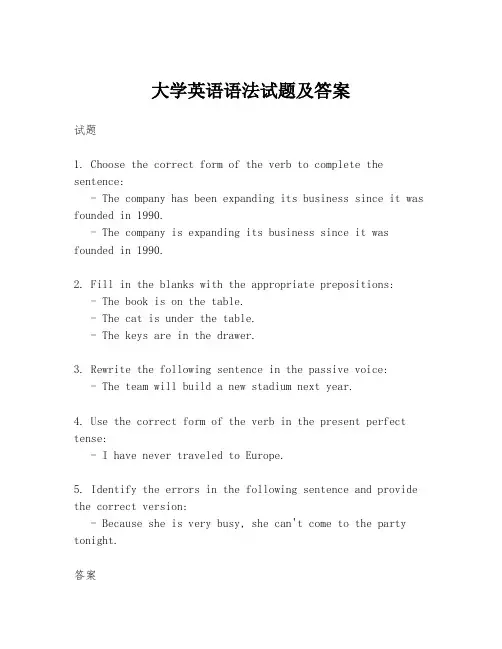
大学英语语法试题及答案试题1. Choose the correct form of the verb to complete the sentence:- The company has been expanding its business since it was founded in 1990.- The company is expanding its business since it was founded in 1990.2. Fill in the blanks with the appropriate prepositions:- The book is on the table.- The cat is under the table.- The keys are in the drawer.3. Rewrite the following sentence in the passive voice:- The team will build a new stadium next year.4. Use the correct form of the verb in the present perfect tense:- I have never traveled to Europe.5. Identify the errors in the following sentence and provide the correct version:- Because she is very busy, she can't come to the party tonight.答案1. The correct form of the verb is "has been expanding". The use of "has been" indicates that the action started in the past and is still ongoing.2. The correct prepositions are:- "The book is on the table."- "The cat is under the table."- "The keys are in the drawer."3. The sentence in the passive voice would be:- "A new stadium will be built by the team next year."4. The correct form of the verb in the present perfect tense is:- "I have never traveled to Europe."5. The correct version of the sentence is:- "Because she is very busy, she cannot come to the party tonight."附加练习6. Choose the correct relative pronoun to complete the sentence:- The man _____ is standing by the window is my uncle.- Options: who, which, that7. Use the subjunctive mood to express a wish:- If I had enough money, I _____ travel around the world. - Options: would, will, could8. Determine the correct tense for the following sentence:- By the time you arrive, I _____ the house.- Options: will have cleaned, have cleaned, had cleaned9. Fill in the blanks with the correct modal verb:- You _____ be careful when you cross the street.- Options: must, should, can10. Rewrite the sentence in the future perfect tense:- By the time we reach the top of the mountain, we will have hiked for five hours.附加练习答案6. The correct relative pronoun is "who".7. The correct form for expressing a wish in the subjunctive mood is "would".8. The correct tense is "will have cleaned".9. The correct modal verb is "should".10. The sentence in the future perfect tense is: "By the time we reach the top of the mountain, we will have hiked for five hours."这些练习题旨在帮助学生复习和巩固英语语法知识,特别是动词时态、语态、介词、连词以及情态动词的使用。
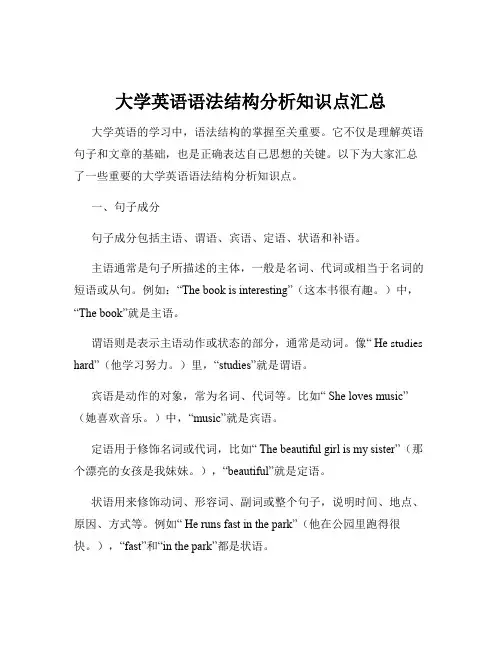
大学英语语法结构分析知识点汇总大学英语的学习中,语法结构的掌握至关重要。
它不仅是理解英语句子和文章的基础,也是正确表达自己思想的关键。
以下为大家汇总了一些重要的大学英语语法结构分析知识点。
一、句子成分句子成分包括主语、谓语、宾语、定语、状语和补语。
主语通常是句子所描述的主体,一般是名词、代词或相当于名词的短语或从句。
例如:“The book is interesting”(这本书很有趣。
)中,“The book”就是主语。
谓语则是表示主语动作或状态的部分,通常是动词。
像“ He studies hard”(他学习努力。
)里,“studies”就是谓语。
宾语是动作的对象,常为名词、代词等。
比如“ She loves music”(她喜欢音乐。
)中,“music”就是宾语。
定语用于修饰名词或代词,比如“ The beautiful girl is my sister”(那个漂亮的女孩是我妹妹。
),“beautiful”就是定语。
状语用来修饰动词、形容词、副词或整个句子,说明时间、地点、原因、方式等。
例如“ He runs fast in the park”(他在公园里跑得很快。
),“fast”和“in the park”都是状语。
补语则是对主语或宾语进行补充说明,比如“ The flower smells sweet”(这花闻起来很香。
),“sweet”就是补语。
二、名词性从句名词性从句包括主语从句、宾语从句、表语从句和同位语从句。
主语从句在句子中充当主语,例如:“What he said is true”(他说的是真的。
)宾语从句在句中作宾语,像“ I don't know where he lives”(我不知道他住哪儿。
)表语从句在系动词之后,充当表语,比如“ T he problem is whetherwe can finish it on time”(问题是我们能否按时完成。
)同位语从句用于解释说明前面的名词,例如“ The news that he won the game is exciting”(他赢得比赛的消息令人兴奋。

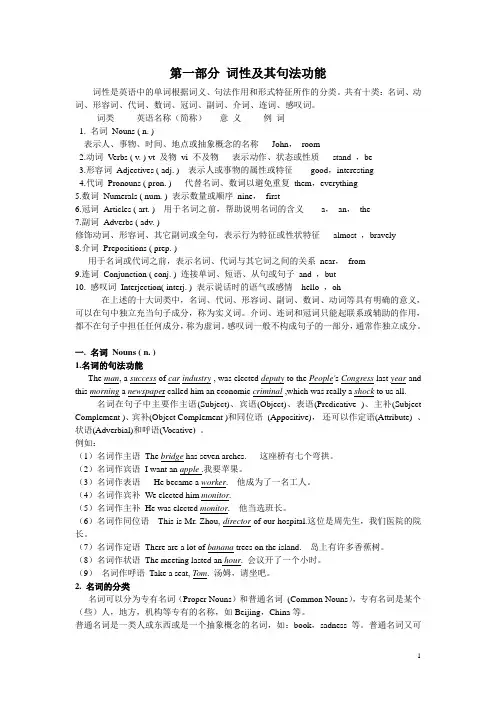
第一部分词性及其句法功能词性是英语中的单词根据词义、句法作用和形式特征所作的分类。
共有十类:名词、动词、形容词、代词、数词、冠词、副词、介词、连词、感叹词。
词类英语名称(简称)意义例词1. 名词Nouns ( n. )表示人、事物、时间、地点或抽象概念的名称John,room2.动词Verbs ( v. ) vt 及物vi 不及物表示动作、状态或性质stand ,be3.形容词Adjectives ( adj. ) 表示人或事物的属性或特征good,interesting4.代词Pronouns ( pron. ) 代替名词、数词以避免重复them,everything5.数词Numerals ( num. ) 表示数量或顺序nine,first6.冠词Articles ( art. ) 用于名词之前,帮助说明名词的含义a,an,the7.副词Adverbs ( adv. )修饰动词、形容词、其它副词或全句,表示行为特征或性状特征almost ,bravely8.介词Prepositions ( prep. )用于名词或代词之前,表示名词、代词与其它词之间的关系near,from9.连词Conjunction ( conj. ) 连接单词、短语、从句或句子and ,but10. 感叹词Interjection( interj. ) 表示说话时的语气或感情hello ,oh在上述的十大词类中,名词、代词、形容词、副词、数词、动词等具有明确的意义,可以在句中独立充当句子成分,称为实义词。
介词、连词和冠词只能起联系或辅助的作用,都不在句子中担任任何成分,称为虚词。
感叹词一般不构成句子的一部分,通常作独立成分。
一. 名词Nouns ( n. )1.名词的句法功能The man, a success of car industry , was elected deputy to the People's Congress last year and this morning a newspape r called him an economic criminal,which was really a shock to us all.名词在句子中主要作主语(Subject)、宾语(Object)、表语(Predicative )、主补(Subject Complement )、宾补(Object Complement )和同位语(Appositive),还可以作定语(Attribute) 、状语(Adverbial)和呼语(V ocative)。
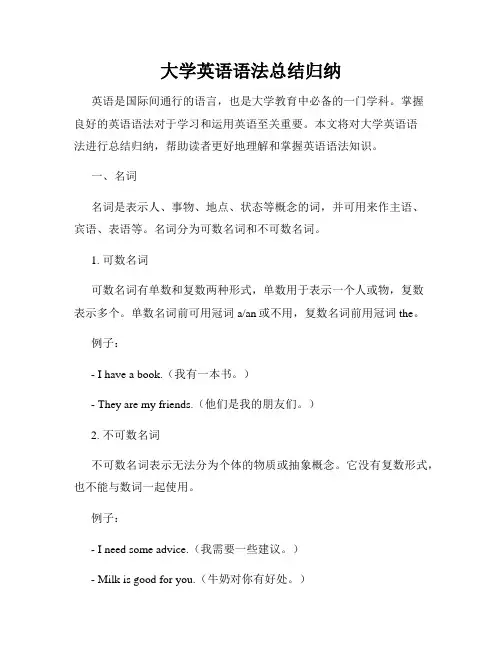
大学英语语法总结归纳英语是国际间通行的语言,也是大学教育中必备的一门学科。
掌握良好的英语语法对于学习和运用英语至关重要。
本文将对大学英语语法进行总结归纳,帮助读者更好地理解和掌握英语语法知识。
一、名词名词是表示人、事物、地点、状态等概念的词,并可用来作主语、宾语、表语等。
名词分为可数名词和不可数名词。
1. 可数名词可数名词有单数和复数两种形式,单数用于表示一个人或物,复数表示多个。
单数名词前可用冠词a/an或不用,复数名词前用冠词the。
例子:- I have a book.(我有一本书。
)- They are my friends.(他们是我的朋友们。
)2. 不可数名词不可数名词表示无法分为个体的物质或抽象概念。
它没有复数形式,也不能与数词一起使用。
例子:- I need some advice.(我需要一些建议。
)- Milk is good for you.(牛奶对你有好处。
)二、代词代词是用来代替名词的词语。
根据其在句子中的作用和意义,代词可以分为人称代词、物主代词、指示代词、疑问代词和不定代词等。
1. 人称代词人称代词用来代替特定的人或事物,在不同的人称角色中有不同的形式。
例子:- I am a student.(我是一个学生。
)- He is my brother.(他是我的兄弟。
)2. 物主代词物主代词用来表示所属关系或所有关系。
在人称代词的基础上,加上-s或-apostrophe+s来构成。
例子:- This is my book.(这是我的书。
)- Is this your cat?(这是你的猫吗?)3. 指示代词指示代词用来指示特定的人或物。
例子:- This is my car.(这是我的车。
)- That is her house.(那是她的房子。
)4. 疑问代词疑问代词用来引导疑问句,询问特定的人或物。
例子:- Who is coming?(谁来了?)- What do you want?(你想要什么?)5. 不定代词不定代词用来代替不确定或泛指的人或事物。
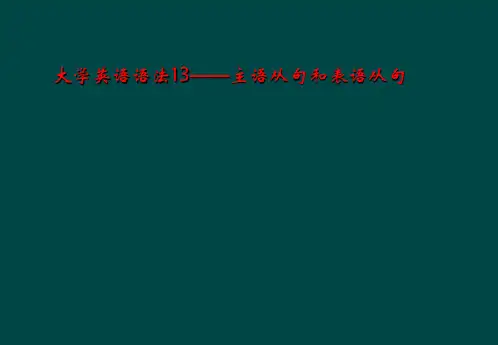
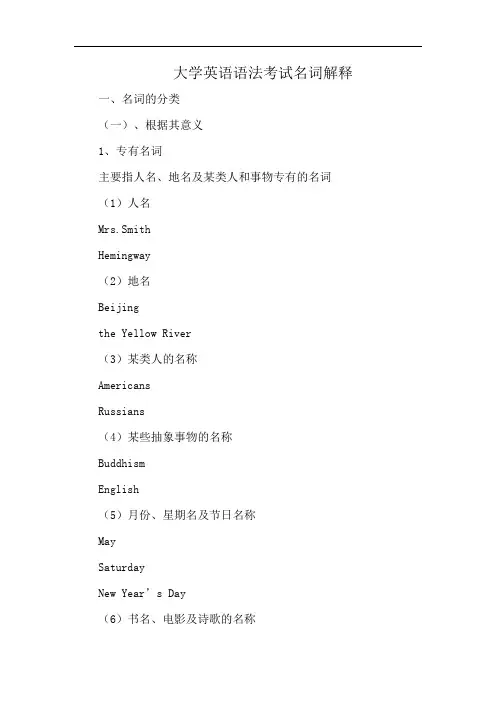
大学英语语法考试名词解释一、名词的分类(一)、根据其意义1、专有名词主要指人名、地名及某类人和事物专有的名词(1)人名Mrs.SmithHemingway(2)地名Beijingthe Yellow River(3)某类人的名称AmericansRussians(4)某些抽象事物的名称BuddhismEnglish(5)月份、星期名及节日名称MaySaturdayNew Year’s Day(6)书名、电影及诗歌的名称Gone with the WindVenomOde to the West Wind2、普通名词指一类人、事物、物质或抽象概念的名称,这些名词一般不用来指某一具体事物(1)个体名词①指作为个体而存在的人或东西可以指具体的人或物He has two sisters. 他有两个姐姐。
Pandas live in the forest. 熊猫生活在森林里。
也可指抽象的东西A new century has just begun. 一个新的世纪刚刚开始。
I had a dream last night. 我昨天晚上做了一个梦。
②个体名词有复数的形式weeksproblems③个体名词单数形式可以和a/an连用a weeka problem(2)集体名词指一群人或一些事物总称,表示由个体组成的集体familyteamaudience(3)物质名称指无法分为个体的东西teaclothrain(4)抽象名词表示一些抽象概念,用来指人或事物的品质、情感、状态等honestylovesilence(二)、根据其语法特征1、可数名词2、不可数名词二、名词的数(一)、可数名词1、定义(1)可用数目计算的名词是可数名词。
(2)个体名词、集体名词大多为可数名词。
2、可数名词单数变复数的规则(1)规则变化①一般情况下,在词尾直接加-sbook→bookstree→treescap→caps 帽子②以-s,-x,-ch,-sh结尾的名词, 在词尾加-esglass→ glasses 眼镜box→boxeswatch→watchesbrush→ brushes刷子③以辅音字母加-y结尾的名词,把y改为i,再加-esstory→storiescountry→countries④以-o结尾的名词变为复数时,常在词尾加-s;但中学英语中下列名词要加-es,它们是:黑人英雄爱吃土豆西红柿radio→radios 收音机photo→photoshero→heroesNegro→Negroespotato→potatoestomato→tomatoes⑤以-f或-fe结尾的名词变复数需把-f或-fe去掉,加-vesself→selves(本身),life→lives(生命)wife→wives(妻子),half→halves(一半)loaf→loaves(面包),shelf→shelves(架子)thief→thieves(小偷),knife→ knives(刀子)leaf→leaves(叶子),wolf→wolves(狼)有些只加-sroofs屋顶cliffs悬崖proofs证据beliefs信仰chiefs主管人,领袖(2)不规则变化①单复数不同行的名词foot→feet(脚),man→men(男人)woman→women(女人), mouse→mice (老鼠)tooth→teeth(牙齿),goose→geese(鹅)gentleman→gentlemen(绅士),child→children(孩子)ox→oxen 公牛②单复数同行的名词Chinese中国人,Japanese日本人means 方法,crossroads 十字路口species种类,sheep绵羊③外来名词的复数形式criterion→criteria 标准curriculum→curricula/ curriculums 全部课phenomenon- -phenomena 现象analysis→analyses 分析basis→bases 基础crisis→crises 危机thesis→theses论文diagnosis→diagnoses 诊断bacterium→bacteria 细菌medium→media 媒体datum→data 数据(二)不可数名词1、定义(1)不可用数目计算的名词。


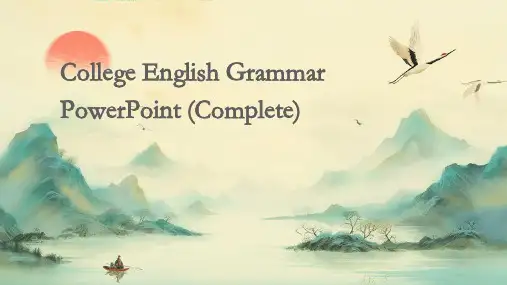
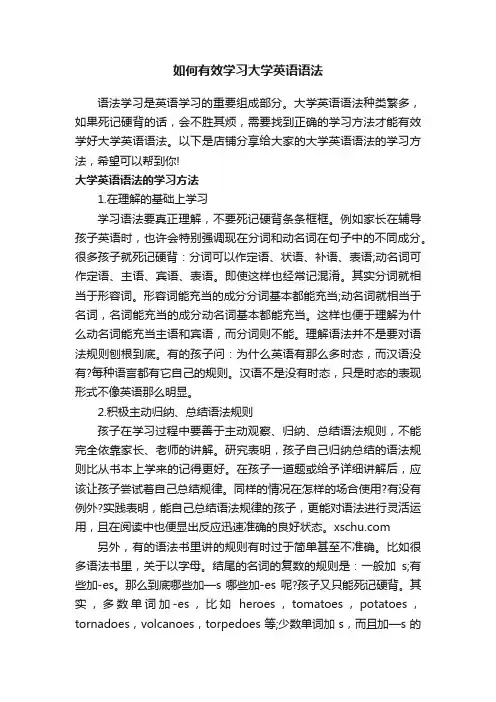
如何有效学习大学英语语法语法学习是英语学习的重要组成部分。
大学英语语法种类繁多,如果死记硬背的话,会不胜其烦,需要找到正确的学习方法才能有效学好大学英语语法。
以下是店铺分享给大家的大学英语语法的学习方法,希望可以帮到你!大学英语语法的学习方法1.在理解的基础上学习学习语法要真正理解,不要死记硬背条条框框。
例如家长在辅导孩子英语时,也许会特别强调现在分词和动名词在句子中的不同成分。
很多孩子就死记硬背:分词可以作定语、状语、补语、表语;动名词可作定语、主语、宾语、表语。
即使这样也经常记混淆。
其实分词就相当于形容词。
形容词能充当的成分分词基本都能充当;动名词就相当于名词,名词能充当的成分动名词基本都能充当。
这样也便于理解为什么动名词能充当主语和宾语,而分词则不能。
理解语法并不是要对语法规则刨根到底。
有的孩子问:为什么英语有那么多时态,而汉语没有?每种语言都有它自己的规则。
汉语不是没有时态,只是时态的表现形式不像英语那么明显。
2.积极主动归纳、总结语法规则孩子在学习过程中要善于主动观察、归纳、总结语法规则,不能完全依靠家长、老师的讲解。
研究表明,孩子自己归纳总结的语法规则比从书本上学来的记得更好。
在孩子一道题或给予详细讲解后,应该让孩子尝试着自己总结规律。
同样的情况在怎样的场合使用?有没有例外?实践表明,能自己总结语法规律的孩子,更能对语法进行灵活运用,且在阅读中也便显出反应迅速准确的良好状态。
另外,有的语法书里讲的规则有时过于简单甚至不准确。
比如很多语法书里,关于以字母。
结尾的名词的复数的规则是:一般加s;有些加-es。
那么到底哪些加—s哪些加-es呢?孩子又只能死记硬背。
其实,多数单词加-es,比如heroes,tomatoes,potatoes,tornadoes,volcanoes,torpedoes等;少数单词加s,而且加—s的词多为较长单词的缩写。
比如:photographs—photos;kilograms—kilos;hippopotamus—hippos等。
虚拟语气虚拟语气表示说话人的愿望、假设、猜测或建议,而不表示客观存在的事实。
虚拟语气通过谓语动词的特殊形式来表示。
I. 虚拟语气用于状语从句1. 虚拟语气用于条件状语从句:(1)表示与过去事实相反的假设时从句中谓语用had+过去分词,主句谓语用would (could, should, might)+have+过去分词If you had taken my advice, you would have passed the exam.(If it had rained, we would not have gone out.)(2)表示与现在事实相反的假设时从句中谓语用过去式(be的过去式为were), 主句谓语用would (could, should, might)+动词原形。
If I were you, I should study English.If he had time, he would attend the meeting.(If it rained now, we would not go out.)(3)表示与将来事实相反的假设时与(2)表与现在相反的假设相同,或用were to+动词原形。
If you came tomorrow, we would have the meeting.If it should stop raining, the crop would be safe.If it were to rain tomorrow, the meeting would be put off.(If it rained tomorrow, we would not go out.)(If it were to rain tomorrow, we would not go out.)(If it should rain tomorrow, we wound not go out.)(4)当从句表示的行为和主句表示的行为所发生的时间不一致时,动词形式要根据它所表示的时间来调整。